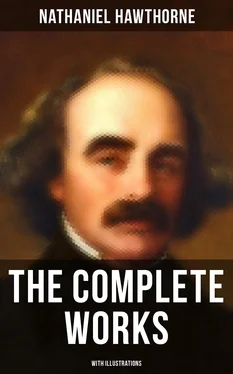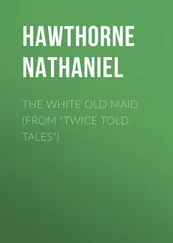“I wish you would speak more plainly,” cried Phoebe, perplexed and displeased; “and, above all, that you would feel more like a Christian and a human being! How is it possible to see people in distress without desiring, more than anything else, to help and comfort them? You talk as if this old house were a theatre; and you seem to look at Hepzibah’s and Clifford’s misfortunes, and those of generations before them, as a tragedy, such as I have seen acted in the hall of a country hotel, only the present one appears to be played exclusively for your amusement. I do not like this. The play costs the performers too much, and the audience is too cold-hearted.”
“You are severe,” said Holgrave, compelled to recognize a degree of truth in the piquant sketch of his own mood.
“And then,” continued Phoebe, “what can you mean by your conviction, which you tell me of, that the end is drawing near? Do you know of any new trouble hanging over my poor relatives? If so, tell me at once, and I will not leave them!”
“Forgive me, Phoebe!” said the daguerreotypist, holding out his hand, to which the girl was constrained to yield her own. “I am somewhat of a mystic, it must be confessed. The tendency is in my blood, together with the faculty of mesmerism, which might have brought me to Gallows Hill, in the good old times of witchcraft. Believe me, if I were really aware of any secret, the disclosure of which would benefit your friends, — who are my own friends, likewise, — you should learn it before we part. But I have no such knowledge.”
“You hold something back!” said Phoebe.
“Nothing, — no secrets but my own,” answered Holgrave. “I can perceive, indeed, that Judge Pyncheon still keeps his eye on Clifford, in whose ruin he had so large a share. His motives and intentions, however are a mystery to me. He is a determined and relentless man, with the genuine character of an inquisitor; and had he any object to gain by putting Clifford to the rack, I verily believe that he would wrench his joints from their sockets, in order to accomplish it. But, so wealthy and eminent as he is, — so powerful in his own strength, and in the support of society on all sides, — what can Judge Pyncheon have to hope or fear from the imbecile, branded, half-torpid Clifford?”
“Yet,” urged Phoebe, “you did speak as if misfortune were impending!”
“Oh, that was because I am morbid!” replied the artist. “My mind has a twist aside, like almost everybody’s mind, except your own. Moreover, it is so strange to find myself an inmate of this old Pyncheon House, and sitting in this old garden — (hark, how Maule’s well is murmuring!) — that, were it only for this one circumstance, I cannot help fancying that Destiny is arranging its fifth act for a catastrophe.”
“There!” cried Phoebe with renewed vexation; for she was by nature as hostile to mystery as the sunshine to a dark corner. “You puzzle me more than ever!”
“Then let us part friends!” said Holgrave, pressing her hand. “Or, if not friends, let us part before you entirely hate me. You, who love everybody else in the world!”
“Good-by, then,” said Phoebe frankly. “I do not mean to be angry a great while, and should be sorry to have you think so. There has Cousin Hepzibah been standing in the shadow of the doorway, this quarter of an hour past! She thinks I stay too long in the damp garden. So, good-night, and good-by.”
On the second morning thereafter, Phoebe might have been seen, in her straw bonnet, with a shawl on one arm and a little carpet-bag on the other, bidding adieu to Hepzibah and Cousin Clifford. She was to take a seat in the next train of cars, which would transport her to within half a dozen miles of her country village.
The tears were in Phoebe’s eyes; a smile, dewy with affectionate regret, was glimmering around her pleasant mouth. She wondered how it came to pass, that her life of a few weeks, here in this heavy-hearted old mansion, had taken such hold of her, and so melted into her associations, as now to seem a more important centre-point of remembrance than all which had gone before. How had Hepzibah — grim, silent, and irresponsive to her overflow of cordial sentiment — contrived to win so much love? And Clifford, — in his abortive decay, with the mystery of fearful crime upon him, and the close prison-atmosphere yet lurking in his breath, — how had he transformed himself into the simplest child, whom Phoebe felt bound to watch over, and be, as it were, the providence of his unconsidered hours! Everything, at that instant of farewell, stood out prominently to her view. Look where she would, lay her hand on what she might, the object responded to her consciousness, as if a moist human heart were in it.
She peeped from the window into the garden, and felt herself more regretful at leaving this spot of black earth, vitiated with such an age-long growth of weeds, than joyful at the idea of again scenting her pine forests and fresh clover-fields. She called Chanticleer, his two wives, and the venerable chicken, and threw them some crumbs of bread from the breakfast-table. These being hastily gobbled up, the chicken spread its wings, and alighted close by Phoebe on the window-sill, where it looked gravely into her face and vented its emotions in a croak. Phoebe bade it be a good old chicken during her absence, and promised to bring it a little bag of buckwheat.
“Ah, Phoebe!” remarked Hepzibah, “you do not smile so naturally as when you came to us! Then, the smile chose to shine out; now, you choose it should. It is well that you are going back, for a little while, into your native air. There has been too much weight on your spirits. The house is too gloomy and lonesome; the shop is full of vexations; and as for me, I have no faculty of making things look brighter than they are. Dear Clifford has been your only comfort!”
“Come hither, Phoebe,” suddenly cried her cousin Clifford, who had said very little all the morning. “Close! — closer! — and look me in the face!”
Phoebe put one of her small hands on each elbow of his chair, and leaned her face towards him, so that he might peruse it as carefully as he would. It is probable that the latent emotions of this parting hour had revived, in some degree, his bedimmed and enfeebled faculties. At any rate, Phoebe soon felt that, if not the profound insight of a seer, yet a more than feminine delicacy of appreciation, was making her heart the subject of its regard. A moment before, she had known nothing which she would have sought to hide. Now, as if some secret were hinted to her own consciousness through the medium of another’s perception, she was fain to let her eyelids droop beneath Clifford’s gaze. A blush, too, — the redder, because she strove hard to keep it down, — ascended bigger and higher, in a tide of fitful progress, until even her brow was all suffused with it.
“It is enough, Phoebe,” said Clifford, with a melancholy smile. “When I first saw you, you were the prettiest little maiden in the world; and now you have deepened into beauty. Girlhood has passed into womanhood; the bud is a bloom! Go, now — I feel lonelier than I did.”
Phoebe took leave of the desolate couple, and passed through the shop, twinkling her eyelids to shake off a dewdrop; for — considering how brief her absence was to be, and therefore the folly of being cast down about it — she would not so far acknowledge her tears as to dry them with her handkerchief. On the doorstep, she met the little urchin whose marvellous feats of gastronomy have been recorded in the earlier pages of our narrative. She took from the window some specimen or other of natural history, — her eyes being too dim with moisture to inform her accurately whether it was a rabbit or a hippopotamus, — put it into the child’s hand as a parting gift, and went her way. Old Uncle Venner was just coming out of his door, with a wood-horse and saw on his shoulder; and, trudging along the street, he scrupled not to keep company with Phoebe, so far as their paths lay together; nor, in spite of his patched coat and rusty beaver, and the curious fashion of his tow-cloth trousers, could she find it in her heart to outwalk him.
Читать дальше












